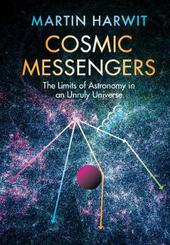
|
Cosmic Messengers: The Limits of Astronomy in an Unruly Universe
Hardback
Main Details
| Title |
Cosmic Messengers: The Limits of Astronomy in an Unruly Universe
|
| Authors and Contributors |
By (author) Martin Harwit
|
| Physical Properties |
| Format:Hardback | | Pages:396 | | Dimensions(mm): Height 250,Width 174 |
|
| Category/Genre | Philosophy of science
History of science
Observatories, equipment and methods
Cosmology and the universe |
|---|
| ISBN/Barcode |
9781108842440
|
| Classifications | Dewey:520 |
|---|
| Audience | | Professional & Vocational | |
|---|
| Illustrations |
Worked examples or Exercises
|
|
Publishing Details |
| Publisher |
Cambridge University Press
|
| Imprint |
Cambridge University Press
|
| Publication Date |
11 February 2021 |
| Publication Country |
United Kingdom
|
Description
Martin Harwit, author of the influential book Cosmic Discovery, asks key questions about the scope of observational astronomy. Humans have long sought to understand the world we inhabit. Recent realization of how our unruly Universe distorts information before it ever reaches us reveals distinct limits on how well we will ultimately understand the Cosmos. Even the best instruments we might conceive will inevitably be thwarted by ever more complex distortions and will never untangle the data completely. Observational astronomy, and the cost of pursuing it, will then have reached an inherent end. Only some totally different lines of approach, as yet unknown and potentially far more costly, might then need to emerge if we wish to learn more. This accessible book is written for all astronomers, astrophysicists, and those curious about how well we will ever understand the Universe and the potential costs of pushing those limits.
Author Biography
Martin Harwit is Professor Emeritus of Astronomy at Cornell University, New York. For many years he also served as Director of the National Air and Space Museum in Washington, DC. For much of his astrophysical career he built instruments and made pioneering observations in infrared astronomy. His advanced textbook, Astrophysical Concepts (1973), has taught several generations of astronomers through its four editions. Harwit has had an abiding interest in questions first raised in Cosmic Discovery on how science advances or is constrained by factors beyond the control of scientists. His subsequent book, In Search of the True Universe (Cambridge, 2014), explores how philosophical outlook, historical precedents, industrial progress, economic factors, and national priorities have affected our understanding of the cosmos. This new book rounds out his informal trilogy on the themes of cosmic discovery. Harwit is a recipient of the Astronomical Society of the Pacific's highest honor, the Bruce Medal, which commends 'his original ideas, scholarship, and thoughtful advocacy'.
Reviews'A fitting conclusion, and perhaps the most provocative of Martin Harwit's trilogy, Cosmic Discovery, In Search of the True Universe, and now Cosmic Messengers, which discusses the limitations of what we can learn about the universe from observational astronomy, and the implications for the future of observational astronomy and society.' Lennard A. Fisk, Thomas M. Donahue Distinguished University Professor of Space Science, University of Michigan 'This brilliant work by the distinguished astrophysicist - and philosophy-of-science theoretician - Martin Harwit brings forward a uniquely synthesized view of astronomy and astrophysics, and how we got to be where we are in understanding the Universe. This magnum opus is a fascinating book that should be read by all astrophysicists and held by all libraries.' Jay M. Pasachoff, Field Memorial Professor of Astronomy, Williams College, Massachusetts '... this is an interesting and challenging book.' Robert Connon Smith, The Observatory magazine 'I am not aware of a better 36-page introduction to cosmology. ... the book is interesting and informative.' William L. Vanderburgh, Metascience 'Cosmic Messengers should be of interest to a wide audience of astronomers, other scientists, historians of science, government agency planners, and anyone who wants to see the fruits of curiosity- driven research. It will also be a valuable resource to students and others aiming to place their research into a much larger context.' James Moran, Physics Today
|